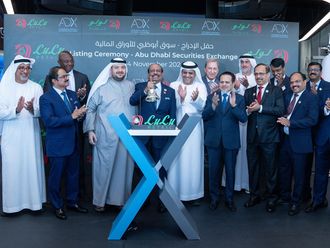So far this year oil prices have risen by as much as $6 (Dh22) per barrel compared to the end of December 2011. There is better economic news from the US and Germany, Asian demand is still growing, and stocks have declined in industrial countries.
But the stronger driving force for the price appreciation is the evolution of the geostrategic situation in the Arabian Gulf region. Tensions are rising between Iran on one side and the US and Europe on the other.
Iran threats to close the strait of Hormuz have been met by counter threats to take action to keep the vital sea lane open. Such threats have not prevented the US and Europe from imposing further sanctions on Iran recently.
A new law in the US would penalise foreign financial entities dealing with Iran's central bank in oil trade by barring them from US financial markets. The US treasury secretary Geithner said "cutting off the central bank from the international financial system will reduce the earnings Iran derives from its oil exports." However, nations can be exempted if they demonstrate a "significant reduction" in Iranian oil imports, and Geithner also described the measure to be "in the early stages" and financial institutions have six months to comply before the US decides whether to impose sanctions.
Alternatives
The European Union has decided to impose an embargo on oil imports from Iran, a decision which is expected to become final by January 23. This will affect about half a million barrels a day of Iranian oil usually consumed in the European Union.
But implementation is likely to be gradual due to the need for south Europeans to find alternatives, especially after Europe's embargo on Syrian crude. It has been even suggested that European implementation may be delayed by six months for these reasons. The situation may be ameliorated by the quicker-than-expected return of Libyan oil. Gulf oil exporters, especially Saudi Arabia, are likely to increase production to counter any reduction in supplies from Iran.
The US is trying to convince other countries that it is serious about its policy towards imports from Iran.
Overtures
Japan has already decided to reduce its imports from Iran, in a "planned manner" even before the Geithner visited Japan recently. Japan is reported to have made overtures to the UAE and Saudi Arabia to provide it with more oil.
South Korea is likely to follow Japan's example as they are US allies and depend on US military power, though both nations are reported to be unhappy with all this, and Japan is especially afraid that oil prices might increase significantly and thereby affect its economic recovery.
Diplomacy has an oil angle these days, and Japan's Minister of Foreign Affairs Koichiro Gemba is touring the Middle East, asking producing countries, to increase oil production and at the same time urging Iran to refrain from its threats to close the Strait of Hormuz.
India, Iran's second biggest customer in Asia, is said to have told its refiners to reduce Iranian oil imports and find alternatives.
Chinese silence
But this contrasts with China's public silence on the matter during Geithner's visit.
China's response was vague because it might find it difficult to replace 600,000 barrels a day it imports from Iran. China has been persistently against sanctions imposed unilaterally. But China is worried about its banks and how they may suffer if they continue to deal with Iran, and how all this might reflect on China's exports to the US. There are reports of reduced imports from Iran this month, but some analysts believe this is because of a price dispute, something unlikely given Iran's situation.
Saudi partner
Here again, diplomacy is in play as the Chinese premier Wen Jiabao is visiting the Gulf countries soon after his meeting with Geithner in Beijing. While China needs Iranian crude, its energy relations with Saudi Arabia are on the rise and its oil company is becoming a partner in the new Yanbu refinery.
The Chinese leader could be seeking additional supplies from Saudi Arabia, the UAE and Qatar. Wen is scheduled to give a speech about China's energy policy at the World Future Energy Summit in Abu Dhabi, but most analysts tie his visit to the supply of oil to China and to seek the views of the visited countries about the situation, especially as China has reiterated its opposition to the Iranian threats.
The writer is the former head of Energy Studies Department in Opec Secretariat in Vienna.












